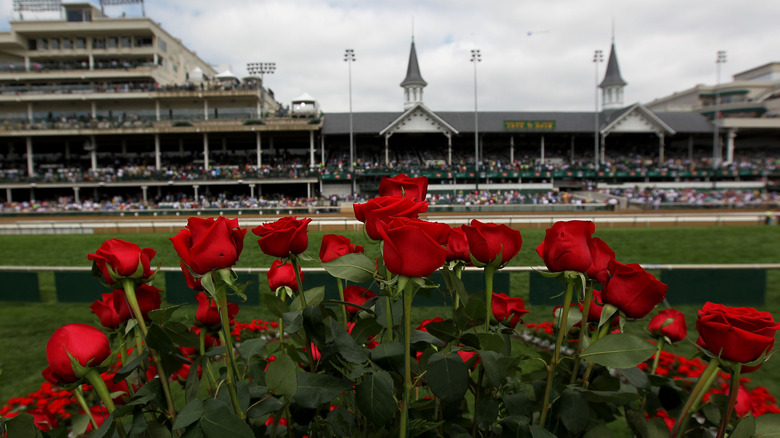The Surprising History Of The Song Played At Every Kentucky Derby
The annual Kentucky Derby rivals Britain's famous horse races for pomp and spectacle. From the lavish blanket of 554 red roses to the elaborate hats worn by spectators, the event is a fun spectacle even for people who don't know a furlong from a fur coat. There are a number of traditions associated with the Derby, such as eating a spicy stew called burgoo while you sip a mint julep (made with genuine Kentucky bourbon, if you please — never rye, according to Mental Floss).
As the horses parade around the track before getting into starting position, the University of Louisville Marching Band plays its rendition of "My Old Kentucky Home." The familiar tune was composed in 1853 by Stephen Foster (seen below, in a statue), who also wrote "Camptown Races" and "Jeannie With the Light Brown Hair." It begins: "The sun shines bright in the old Kentucky home/'Tis summer, the people are gay/The corn-top's ripe and the meadow's in the bloom/While the birds make music all the day. ... Weep no more, my lady/Oh! Weep no more today!/We will sing one song for the old Kentucky home/For the old Kentucky home far away."
To most listeners today, the song is a loving ode to the Bluegrass State — it was adopted as the Kentucky anthem in 1928. In fact, Foster's song refers to a much darker time in American history.
The song is actually an anti-slavery statement
Smithsonian magazine explains the startling origins of the Derby anthem. Foster was inspired to write "My Old Kentucky Home" after reading the famous anti-slavery novel "Uncle Tom's Cabin," and originally titled it "Poor Uncle Tom." While it begins happily enough, the tone takes a sudden dark turn: "By 'n' by Hard Times comes a-knocking at the door/Then my old Kentucky home, goodnight." Those "hard times" refer to the narrator being torn away from his family and sold to work in the sugarcane fields.
The rest of the song expresses the family's sorrow at being separated — "They sing no more by the glimmer of the moon/On the bench by the old cabin door" — and the cruelty of slavery — "The head must bow and the back will have to bend." It concludes with the narrator's hope for freedom either in this lifetime or the next: "Just a few more days for to tote the weary load ... Then my old Kentucky home, goodnight."
Performers began singing only the first verse in the early 20th century, which turned it into a nostalgic look at the antebellum plantation life — exactly the opposite of Foster's message. Out of context, that verse also became racially tone-deaf, since it included a controversial word for slaves. Not until 1986 did the state legislature officially change the lyric to "people."
As you sip on your julep this Derby Day, take a moment to recall those for whom a safe and happy home was — and still is — a distant dream.

